【新唐人2012年4月6日訊】4月4號「清明節」是中國傳統追思、祭拜死者的日子,來自大陸各地的民眾紛紛前往北京「八寶山公墓」掃墓,並表達對中國民主化的期盼,不過,當天至少有兩千人被當局抓到「久敬莊」黑監獄,被關押的民眾抗議,衝破了黑監獄鐵門﹔另有訪民到天安門廣場和楊佳的墓地悼念祭拜,也被警察抓捕。分析指出,現在中國的民怨沸騰,造成中共神經過敏,以前是中共製造恐懼來威脅中國的百姓,現在百姓把恐懼還給了它們。
中國各地訪民紛紛在「清明節」這天前往北京「八寶山公墓」掃墓,但遭到守候在周圍的警察及各地截訪人員攔截,至少二千人被強制送到「久敬莊」黑監獄關押,訪民們集體抗議,衝倒了黑監獄鐵門。 當局懼怕他們再度集結「久敬莊」抗議,於是用車將人拉走,送往北京南站。
「權利運動」組織發起人胡軍指出,中共知道現在民怨沸騰,神經過敏的恐慌害怕,一點風吹草動就抓人打壓。
「權利運動」組織發起人胡軍:「 中共高層造成的這種氛圍,它們知道(民怨)已經到了快爆燃的時候了,它們感到恐慌害怕,任何一點點行動它們都感到恐懼,以前的話,是它們製造恐懼來威脅整個中國的百姓,現在恐懼已經還給它們了。他們每天在中南海坐臥不安,恐慌害怕,天天神經過敏。」
4號,也有十多名訪民前往北京楊佳墓地祭拜,訪民說,墓地到處是戒備的公安,還安裝監控攝像頭,毛恆鳳等5位訪民剛到墓地,就被警察抓捕。下午,北京訪民李學慧去給被關押的訪民送礦泉水、牛奶等食物,也被警察抓了起來。
吉林訪民郭宏偉告訴《新唐人》,他和幾位訪民4號早上前往天安門紀念碑前悼念先烈,然後去「北京福田公墓」拜祭楊佳,他們剛開始祭拜,馬上被警察抓到派出所詢問筆錄。
郭宏偉:「(警察)問你們為啥在拜祭楊佳?我們告訴因為楊佳是被警察傷害了,在我們的心目中楊佳是英雄,我們欣賞他的英勇。我們有難處了,有啥事了,找到北京來了,北京我們認為中央權力最高機構了,來接待我們的還都是本省的,回去還都被打壓了,拘留的,教養的,判刑的,非常無奈,不理解。」
北京青年楊佳在上海旅遊時遭警察盤查施虐,在上訪多次沒有結果之後,楊佳在2008年7月1號,闖入上海市公安局閘北分局討說法,殺害了多名警察。中共迅速的將楊佳判刑處死。
而「楊佳襲警案」開庭那天,上海上千民眾在現場聲援,高呼:「楊佳萬歲!打倒共產黨!打倒法西斯!」現場民眾揮舞著「刀客不朽」的條幅。此後,每年的清明節,不少訪民情願冒著被打壓的危險也要去悼念楊佳。
毛恆鳳:「 政府太不講人權,人最基本的權力都沒有,楊佳我們認爲是反暴力,就是有反抗的精神,我們認爲他是英雄,我們中國太少這樣的英雄。」
胡軍:「 他們去紀念楊佳,就是現在的民怨已經達到了頂沸,特別是政法系統,造成的一切冤假錯案,對訪民、對中國的老百姓進行敵視,反過來訪民也把它們看作敵對方,所以他們(訪民)就要去紀念楊佳。它已經矛盾發生轉化,已經敵對方式對待警察。」
胡軍還表示,中共要想平息目前沸騰的民怨,消除自心的恐懼,那就是開放言論,還權予民。
採訪/朱智善 編輯/李韻 後製/郭敬
--------------------
Petitioners Arrested Commemorating Yang Jia Protest and Break the Jail Gate
April 4th is the Qingming festival, on which day it's a tradition
for Chinese people to commemorate the deceased.
On that day, many Chinese civilians went to Beijing's
Babaoshan Cemetery to express their mourning and their expectations for China』s democratization.
However, at least 2000 people were illegally arrested and
sent to a black jail called “Jiujing Zhuang”.
The detained civilians consequently carried out
a massive protest and broke the jail gate.
Some other petitioners were also detained by the police when
they went to Tiananmen Square or to Yang Jia's grave to mourn.
Analysts remarked that, the CCP authorities have become extremely
nervous as Chinese people's resentment continuously rises;
though the CCP has always intimidated and
terrorized the Chinese people,
now it's time for those same authorities to feel terror
at the resentment and frustration of the masses.
On the day of the Qingming festival, many petitioners from all
over China went to the Babaoshan Cemetery located in Beijing.
They were intercepted by waiting police. At least 2000 were
put into an illegal jail called “Jiujing Zhuang”.
The petitioners then carried out a massive protest and
successfully broke down the jail gate.
Being afraid of another massive protest at the jail, the CCP
authorities consequently moved the petitioners to Beijing South Railway Station and tried to send them back home.
One of the Chinese “Rights Movement” initiators Hu Jun
has said that,
the authorities are only too aware of the protesters'
resentment towards them;
therefore they are extremely nervous and
are liable to arrest people for any reason.
(Chinese “Rights Movement” initiator Hu Jun) tells us:
”Such an environment is created by the CCP leaders.
They know very well how critical people's resentment is,
and so they are scared and prone to panic.
Any trivial incident can trigger or even intensify such feelings.
In the past, it's been the CCP who has always intimidated
the Chinese people, making their lives hell.
Now those authorities are experiencing payback from
the people they tormented for so long.
I believe that from now they will never have a moment
of peace in Zhongnanhai,
that they will constantly fear situations brought about by
the growing resentment of the people.”
On April 4th, over ten petitioners went to
Yang Jia's grave to mourn.
They reported that there were police everywhere in the
graveyard. Cameras had also been set up for surveillance.
Mao Hengfeng and four other petitioners were arrested
upon arrival by the police.
In the afternoon, Beijing petitioner Li Xuehui tried to deliver
bottled water and milk to those who had been arrested, but was also detained.
Jilin petitioner Guo Hongwei has told NTD that,
he and several petitioners first went to the monument at
Tiananmen Square and then they went to the Futian Cemetery to commemorate Yang Jia.
They were approached by the police as they began mourning
and were taken to the local police precinct for interrogation.
(Guo Hongwei) says: ”We were asked (by the police)
why we went to mourn Yang Jia.
We told them that Yang Jia's right had been violated by the
police and that we regarded his response as heroic and valiant.
We came to Beijing because our rights had been illegally
violated by the local government and we came to tell those in power at the top about this.
However, in Beijing we only found local officials
who were able to deal with us.
Those of us who went back home were suppressed, detained,
sent to labor camps or sentenced.
We can't understand this impossible situation and feel helpless.”
Yangjia was a youngster from Beijing. He was interrogated
and beaten by the local police during his trip in Shanghai.
After suing several times and making no progress,
he entered the police headquarters in Zhabei district of
Shanghai on July 1st, 2008 and stabbed several police officers.
The CCP authority passed a quick death sentence and
Yang was executed in November, 2008.
On the day of Yang Jia's court hearing, thousands gathered
before the courthouse shouting “Long live Yang Jia! Down with the CCP! Down with fascism!”
They were holding banners saying things
like “Eternal glory to the stabber”.
Since then, many petitioners have gone to commemorate
Yang Jia during the Qingming festival despite the risk of being arrested for doing so.
(Mao Hengfeng):”The CCP has never respected human rights.
We live without even the most fundamental rights.
We think that Yang Jia had a great revolutionary spirit and
regard him as a hero of the people. China is really in need of such heroes today.”
(Chinese “Rights Movement” initiator Hu Jun) says: ”The
commemoration of Yang Jia tells us that the people's resentment is at a critical level,
especially towards the political and law system in China.
All of the injustices committed by the authorities are evidence
of a total hostility towards petitioners and the Chinese people.
In return the petitioners have finally also become
hostile those same authorities.
As a result of this state of affairs, the petitioners went to
commemorate Yang Jia who they regard as a hero.
The conflict has now intensified to an advanced stage.”
Hu Jun has further remarked that, the only possible solution
for the CCP now to relax the tension it's authorities feel,
and to ease the civil resentment is to return the power to
Chinese people and to let them speak freely.
看下一集
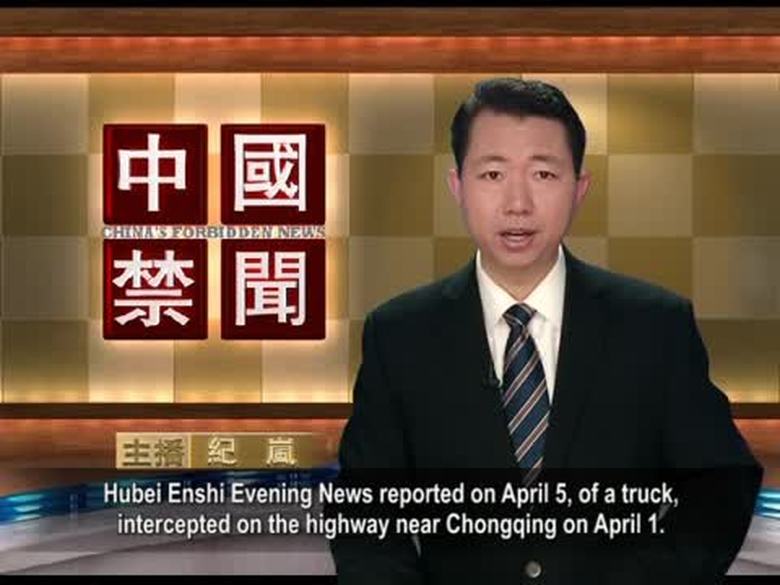
【禁聞】重慶貨車私運軍火 官方說辭矛盾
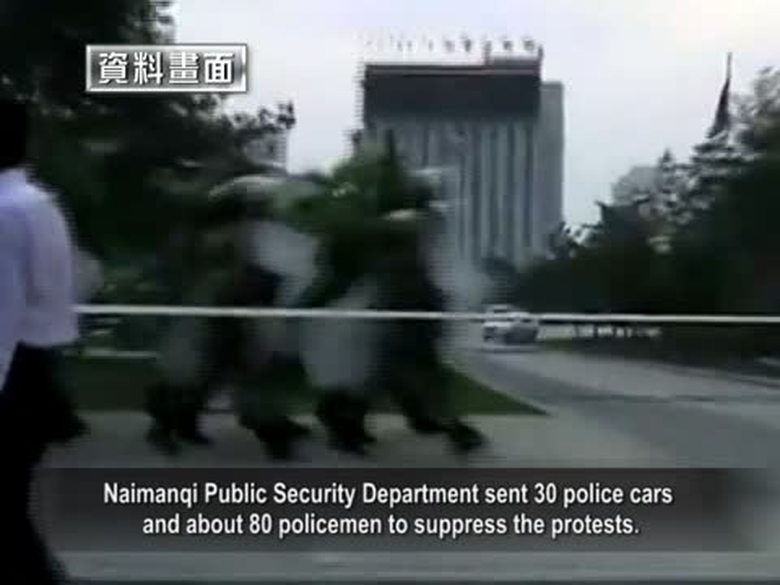
【禁聞】堅持抗爭 內蒙牧民拒絕條件交換
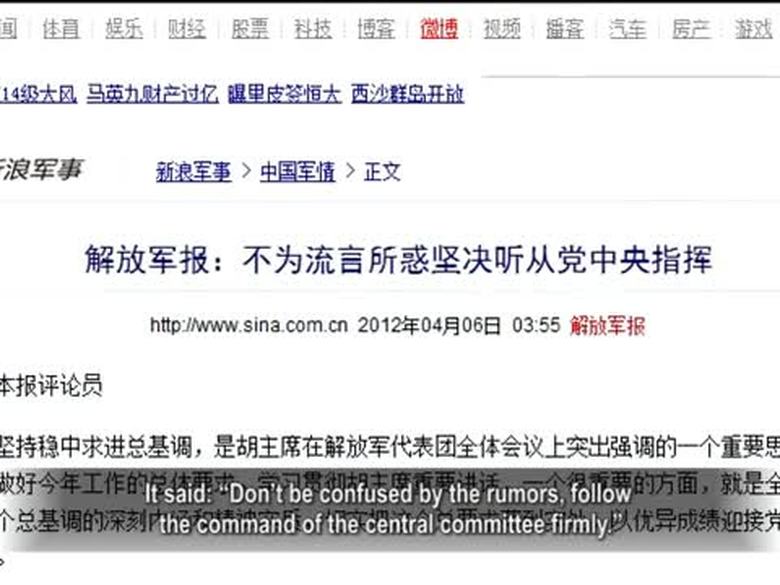
【禁聞】軍隊再表忠 大員輪番表態挺胡棄江

【禁聞】中共特色 部委食堂一元錢午餐
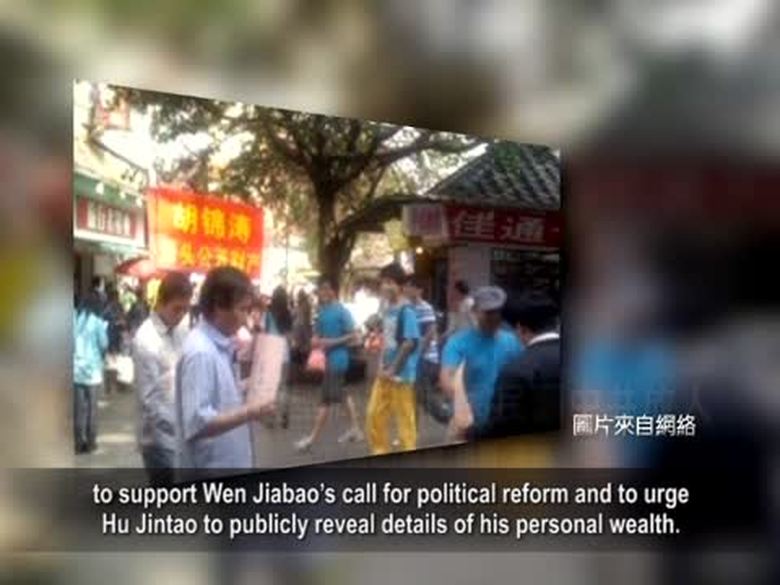
【禁聞】廣州街頭舉牌被抓 網民籲中共放人
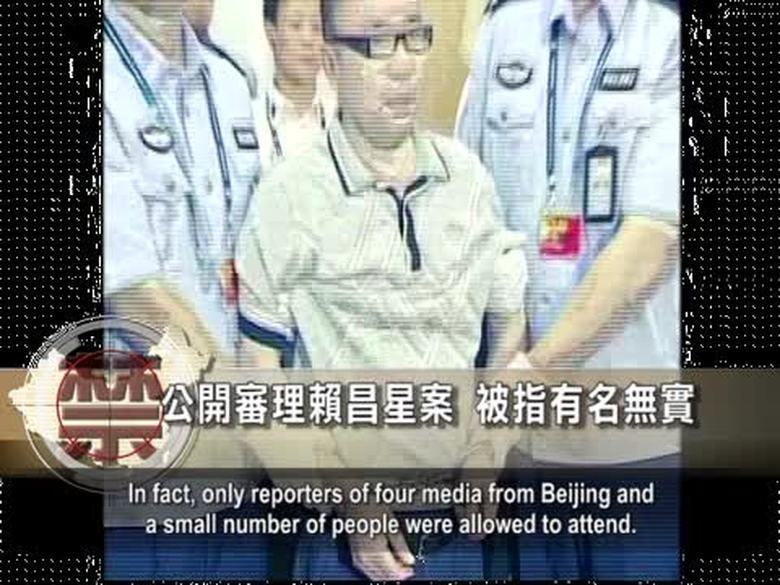
【禁聞】公開審理賴昌星案 被指有名無實
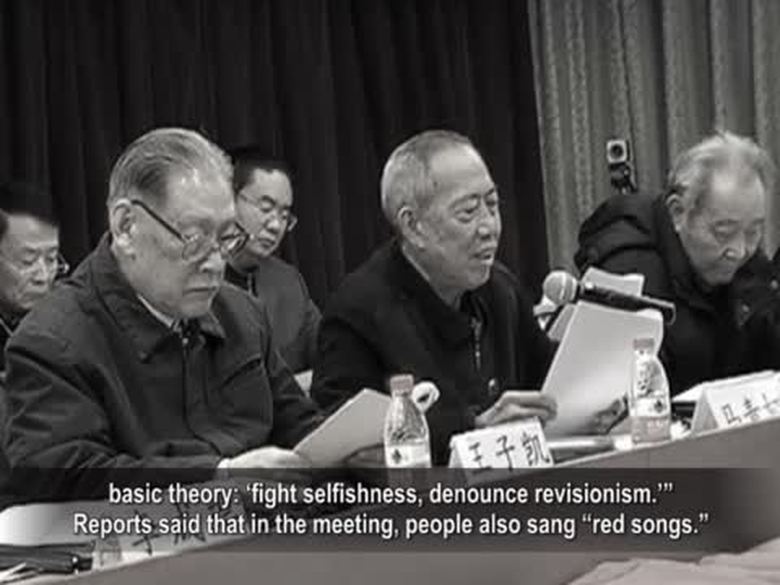
【禁聞】毛派開班唱紅 外媒:批毛者居多

【禁聞】毛派開班唱紅 外媒:批毛者居多
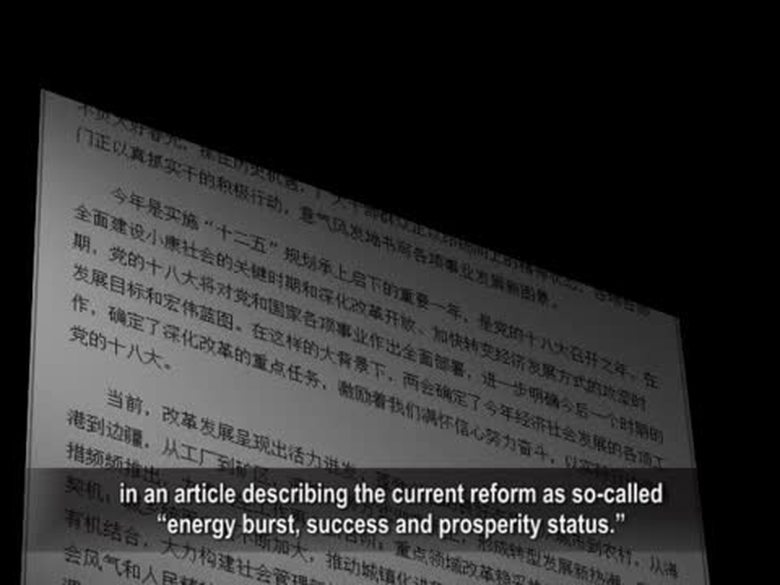
【禁聞】黨報十八大信心喊話折射政權危機

【禁聞論壇】中共要政改了嗎?

【禁聞】全軍審計小組成立 胡項莊舞劍?

【禁聞】著作權只保障3個月 進步?倒退?

【禁聞】藍述:中共不可逾越的兩大危機(上)

【禁聞】六四領袖方勵之離世 大陸封鎖消息

【禁聞】百度解禁「法辦江羅」 血債派罪行曝光

【禁聞】「拿下薄熙來」 喬石發揮作用








